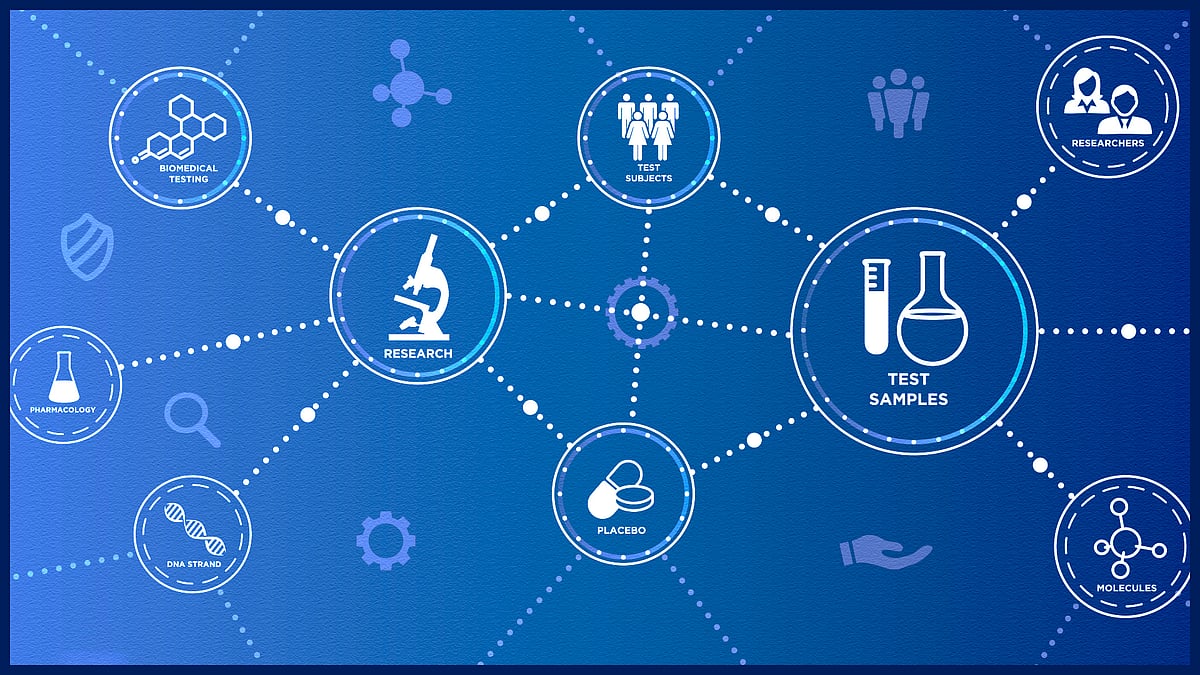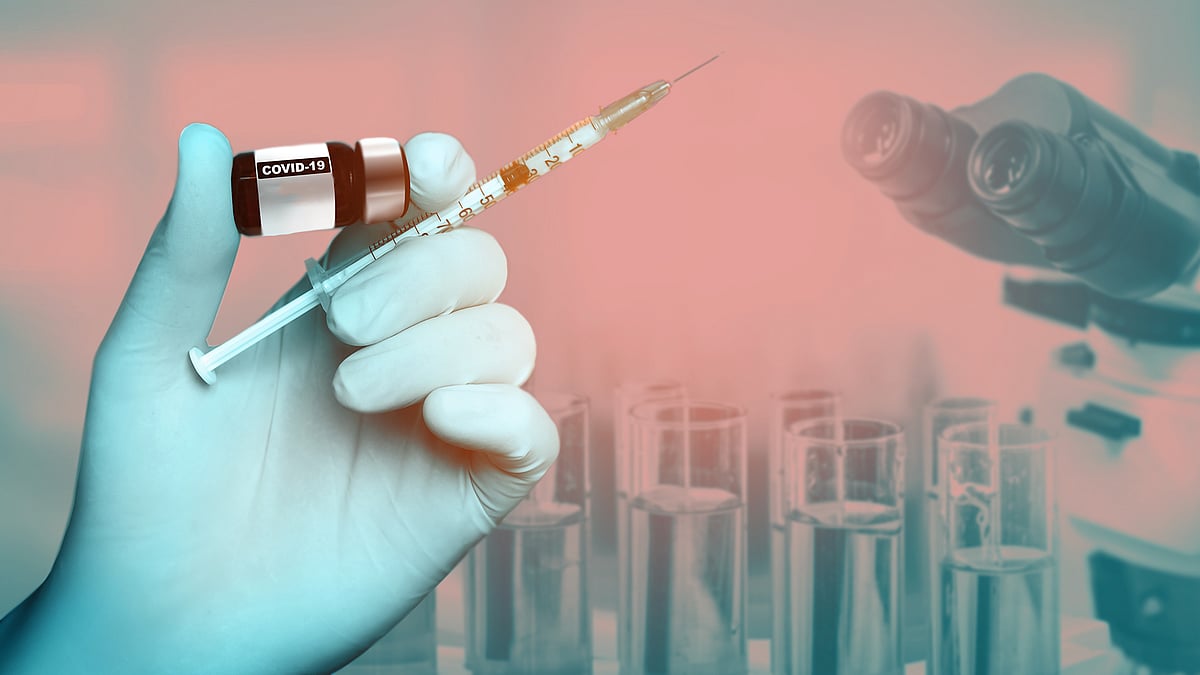Between Trump’s idea of modern medicine and India’s traditional medicine, science is Covid’s latest casualty
Ayurvedic products are not scientifically proven but neither are many superhero drugs promoted by pharmaceutical companies.
Sometimes, the only way to make sense of a confusing landscape is to take apparently unconnected events from different parts of the world and join the dots.
On October 5, Donald Trump ended his stay at the Walter Reed Army Hospital and returned home to the White House. According to news reports, he had been treated with oxygen (even before he was taken to hospital), a cocktail of antibodies made by US company Regeneron, a five-day course of Remdesivir, and, for good measure, dexamethasone.
Given that it was said to be a mild coronavirus infection, that is quite a belt-and-braces approach. But then again, the patient was Donald J Trump, the United States president.
A day later, Martin Landray, Oxford’s professor of medicine and epidemiology, tweeted the results of the latest randomised controlled trial under the Recovery Groups programme of rolling trials of Covid treatments. This was a trial of Lopinavir-Ritonavir combination therapy given to 1,616 patients with Covid severe enough to be admitted to hospital. There was no mortality advantage compared to the 3,424 patients who had been randomised to standard care.
On the same day, nearer home in New Delhi, India’s union health minister Dr Harsh Vardhan, along with Shripad Naik, launched a national clinical management protocol for Covid based on ayurveda and yoga. Naik is India’s minister for Ayush, an acronym that stands for ayurveda, yoga, unani, siddha and homeopathy.
According to a press release, the protocol is just the start of the government’s plans to integrate traditional systems of medicine into the mainstream of efforts against Covid. It would be “immensely beneficial to the public since these solutions are easily accessible and will help to alleviate the hardships brought in by the pandemic”.
The present protocol covered ayurveda and yoga, but subsequent releases would also include “other disciplines of Ayush”.
So, while Trump was treated swiftly with unproven, potentially dangerous drugs from modern medicine, India’s government was rolling out ancient remedies unproven against any disease, never mind a viral infectious disease that no one from any discipline of medicine, traditional or modern, had even heard about until a few months ago. Caught in the middle are all those thoughtful scientific practitioners of modern medicine who rely on the kind of detailed research trials that the Oxford group is spearheading.
But it was Naik’s assertion during the Ayush protocol launch that there had been “many clinical, observational studies to understand the role of Ayush intervention in mitigation and management of Covid” that caused the most controversy. Critics argued, quite rightly, that clinical observational studies are not only inadequate but potentially misleading to answer important questions of the efficacy and value of drugs in specific clinical situations.
True, there are quite a few trials of Ayush remedies for Covid listed in the Clinical Trials Registry, India. However, they are mostly poorly designed small-scale studies with minuscule sample sizes. None have yet reported their results in peer-reviewed publications. Other than a general assertion, the national clinical protocol does not specifically refer to any research studies in support of any of its recommendations.
It is a safe conclusion that there is little or nothing by way of reliable or reproducible evidence that would support the sweeping claims made in the recently released Ayush clinical protocol for Covid management.
The Indian Medical Association made exactly this point in their open letter challenging the health ministry and its head, Dr Harsh Vardhan, accusing him of perpetrating a fraud on the public by advocating treatments that had no basis in evidence. The body that represents doctors professing modern medicine said that it was misleading to refer to ayurvedic preparations as drugs. The suggestion was that such treatments were little better than “placebos”.
However, by failing to be understated, civil, consistent and objective in their criticism of unscientific practices by practitioners of both modern medicine and Ayush, the IMA not only did not do the cause of patients any good, they also provoked a sharp backlash from the body representing practitioners of traditional systems of medicine. The IMA’s five rhetorical questions to the health minister earned them five equally rhetorical questions from the traditional medicine lot.

Where, asked the “scientists” of the Central Council for Research in Ayurvedic Sciences, was the convincing evidence in favour of Remdesivir or Hydroxychloroquine or Methylprednisolone in curing Covid? Had most surgical procedures been subjected to randomised control trials? Did not modern medicine drugs cause severe side effects? How could the IMA cast aspersions on Ayush drugs before putting their own house in order?
But the clincher argument put forward was that ayurvedic treatment was a personalised prescription tailored for each patient’s condition and, therefore, not amenable to assessment by the paradigm of clinical trials.
The irony of this argument is of course that it undermines the Ayush ministry’s claim that it is encouraging clinical trials of traditional medicine remedies according to the methodology of the controlled trial that is so beloved of purists in modern medicine.
The IMA, of course, does not cover itself in glory in this sorry story of scoring cheap points. They raised no protest when Biocon chose to rely on a trial of 30 patients to claim a therapeutic breakthrough for their monoclonal antibody drug Itolizumab. They made no protest when the Indian drugs regulator decided on the basis of a hopelessly inadequate trial to grant this drug an ill-specified “emergency use authorisation” which did nothing to prevent the company from claiming official validation for their bid to market this drug as a breakthrough in Covid treatment. They have never censured their own members who routinely practise overdiagnosis and overtreatment in pursuit of profits.
All this makes their claim of acting to protect the public from the fraud of Ayush specious, at best, and, at worst, open to the charge of being driven by self-interest.
The real casualty in this is, of course, science and the scientific temper.
Ayurveda has a strong hold on the psyche of upper caste Indians. The Chinese have their version of traditional medicine and in much of the West, the fad for various versions of “alternative medicine” is gaining ground. What is remarkable about Ayush in India is the level of state backing for it. The claim that it is useful or effective because it is ancient and is referred to in the Vedas is manifestly bogus. The fact that it has not changed over millennia and that its practitioners and proponents can claim effectiveness against new and evolving diseases should be reason enough to suspect that it is little more than snake oil, and, therefore, reason to subject it to rigorous evaluation by the modern science of randomised clinical trials.
The debate between modern medicine and Ayush has also obscured the far more important debate we need to have: the one between science and non-science. The difference between modern medicine and Ayush is not so much the source of the products used by each, but the processes used to evaluate efficacy. In modern medicine, the process is driven by scepticism and objective data collected in hard-nosed experiments to test rigorously formulated hypotheses. In ayurveda, you have to take it on faith. There is no process of rigorous evaluation. “It says so in the book, and the book is ancient, and therefore it cannot be challenged” is the very basis of faith — blind, unquestioning and unwavering.
But now Ayush is, however reluctantly, doing clinical trials, albeit trials that are pitifully small and poorly designed and doubtfully executed and analysed. There is no evidence of a rigorous peer-review process. Of course, the very process of peer-review in modern scientific medicine has fallen into disrepute or been called into question, but surely the fact that this has happened at all and that the sceptics and the critics are from the same discipline must provide some level of comfort that the system is robust enough to self-correct.
It is true that parts of modern medicine are based on tradition that has not been tested rigorously. That criticism provides no justification to Ayush practitioners to eschew completely the process of rigorous evaluation of their remedies
The only hope is that one day, traditional medicine academics will have the faith and confidence in their discipline to conduct a clinical trial on the basis of which they conclude that an Ayush product is of no value. Just as the Oxford trialists reported that the Lopinavir-Ritonavir combination added zero value.
***
The media industry is in crisis. Journalists, more than ever, need your support. You can support independent media by paying to keep news free. Because when the public pays, the public is served and when the advertiser pays, the advertiser is served. Subscribe to Newslaundry today.
 It doesn’t just matter if a treatment works. We also need to know how well it works
It doesn’t just matter if a treatment works. We also need to know how well it works
 How can we be sure that a drug treatment for Covid really works?
How can we be sure that a drug treatment for Covid really works?
